Packers Report Card: Grades From Loss to Bills
GREEN BAY, Wis. – The Green Bay Packers lost. Again. If losses to the Jets, Giants and Commanders were surprises, Sunday night’s 27-17 loss at the Buffalo Bills was as predictable as April showers, May flowers and first-round receivers in mock drafts.
The Packers trailed 24-7 at halftime. Really, not much that happened thereafter holds much relevance. Aaron Jones had a big night against a defense that rarely lined up with the intention of stopping the run. Jaire Alexander had a big night, too, but was unable to cover Stefon Diggs and Gabe Davis at the same time.
The passing game was typically feeble. The tackling was atypically terrible.
The Packers hadn’t run the ball in weeks – they were the most pass-heavy team the previous three games – so they took the opposite approach on Sunday. Running the ball and playing keepaway can help keep the team close but, at the end of the day, limiting Josh Allen’s possessions also limits Aaron Rodgers’ possessions – not ideal when down by three scores.
“I think we’ve got to find that balance,” coach Matt LaFleur said, singing a similar tune but with different lyrics. “I was super-proud of our ability to come off the football. I think everybody was blocking hard – tight ends, running backs, receivers. The runners were running hard. I thought Aaron did a fantastic job getting us in and out of good looks. But I also think that we have to be able to mix it up a little bit.”
Defensively, the Packers finally played a good second half. Unfortunately, they were trounced in the first half. Maybe Allen had gotten bored, much to the pleasure of those who bet on the Packers as 10.5-point underdogs.
Here’s our Week 8 report card.
Passing Offense
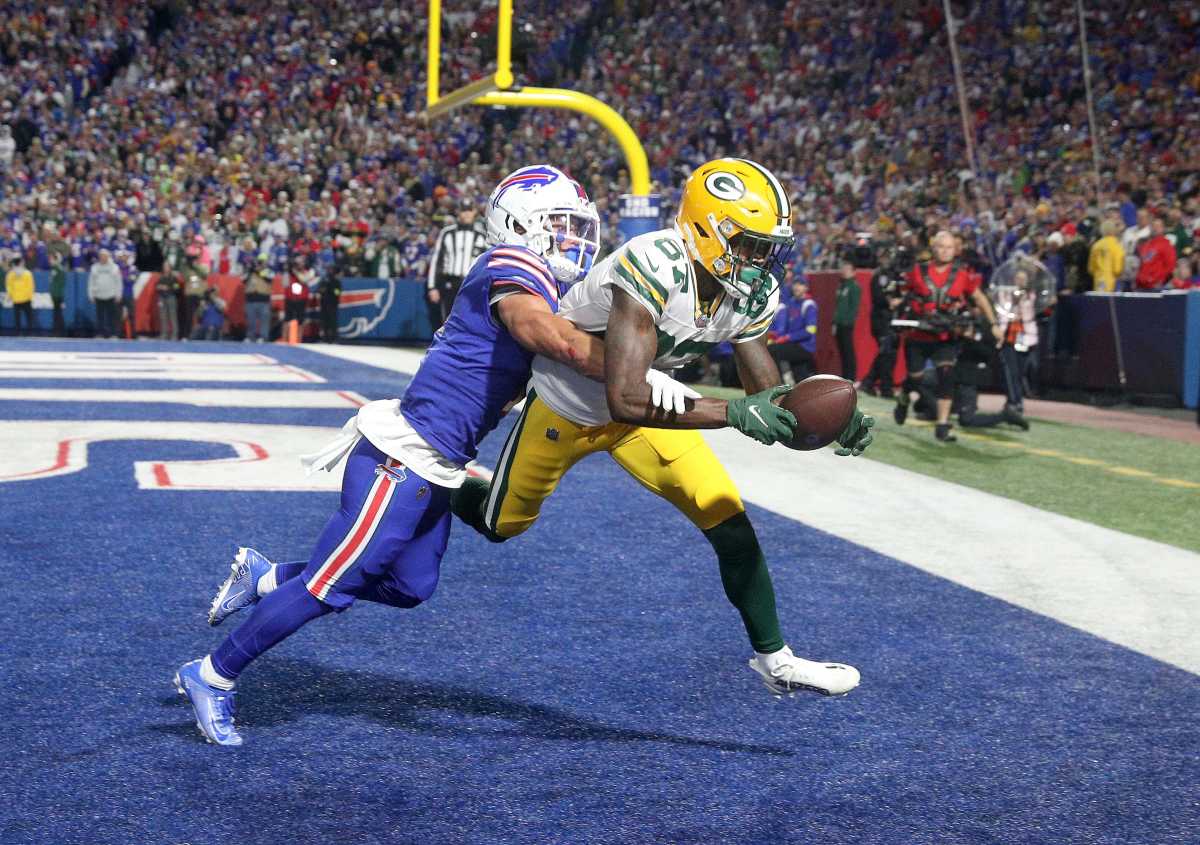
Romeo Doubs catches a touchdown pass. (Photo by USA Today Sports)
After three quarters, Aaron Rodgers was 11-of-14 passing. With sacks factored in, Green Bay had 61 net passing yards. No surprise, right? The Packers’ receiver corps, a below-average bunch when at full strength, played without Allen Lazard (inactive) and Randall Cobb (injured reserve), then lost rookie Christian Watson to a concussion on his sixth snap. The only proven receiver on the field was Sammy Watkins. He caught a 3-yard pass to convert a third-and-2 on the opening series. He never saw the ball during his final 49 snaps.
With the Packers facing a 27-10 deficit, Rodgers threw for 129 yards in the fourth quarter. He’s taken a lot of heat from fans but can still sling it. Those were some big-time throws to Amari Rodgers and Romeo Doubs, and the touchdown to Samori Toure was the equivalent of a 100 mph fastball from Josh Hader. Trade or no trade, the Packers need their rookies to emerge as playmakers. Doubs was great on a 19-yard touchdown and 26-yard catch. Toure showed the type of beyond-the-playbook feel that Rodgers constantly talks about.
The pass protection was terrible to start the game but got better as the night progressed. Would the outcome of the game been any different had Rodgers had time to hit tight end Josiah Deguara on the opening fourth-and-3? Instead, rookie left guard Zach Tom was shoved into Rodgers’ lap and the pass landed in the middle of nowhere.
Back in the lineup, David Bakhtiari was great. AJ Dillon was the unnoticed hero on the touchdown pass to Toure, blocking Gregory Rousseau one-on-one long enough for Toure to snake his way downfield and into a void in the end zone.
Grade: D-plus.
Rushing Offense
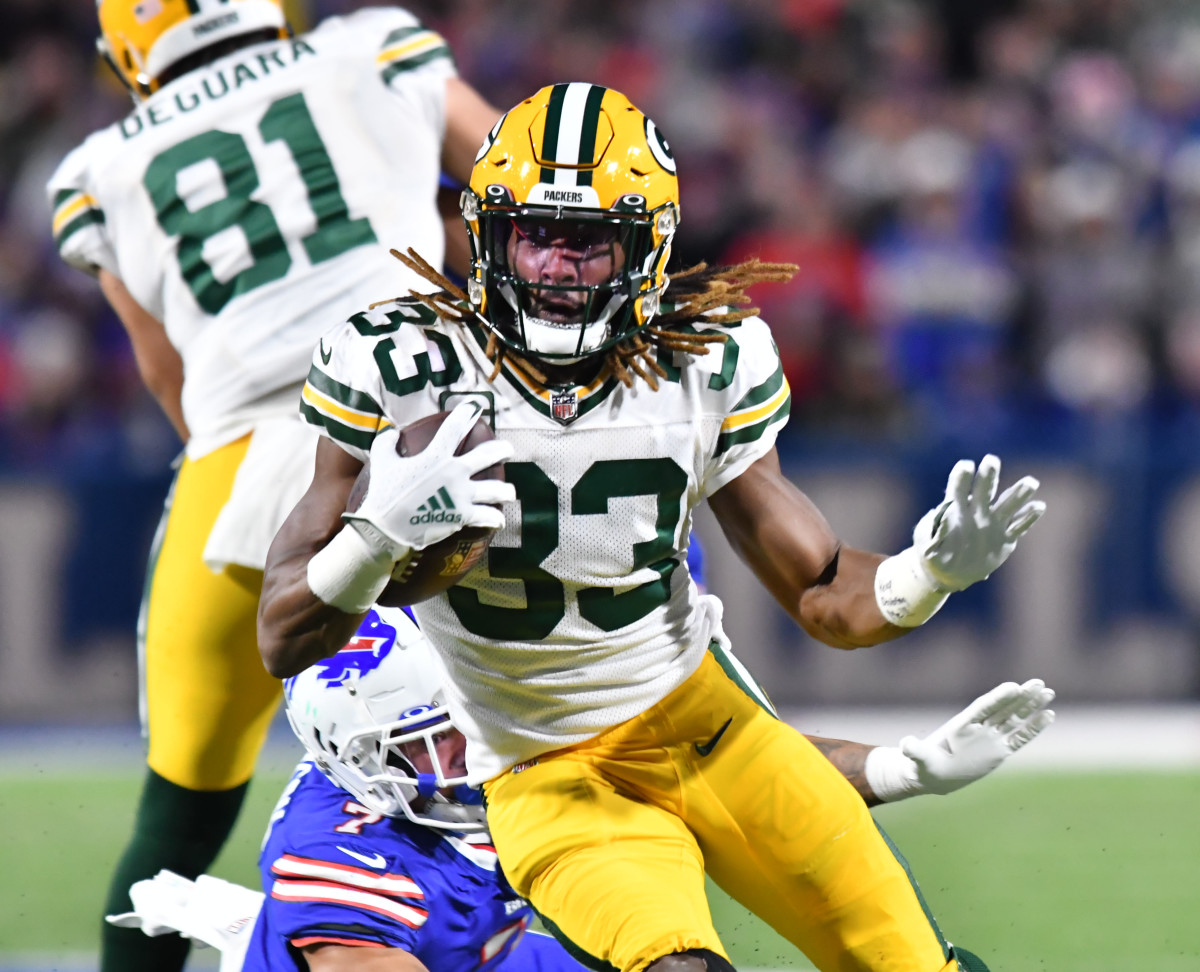
Aaron Jones had one of the best nights of his career vs. Buffalo. (Photo by USA Today Sports)
What a night. Aaron Jones was the best player on the field, regardless of uniform color. He carried 20 times for 143 yards, a 7.2-yard average. The blocking was very good, to be sure, but Jones was at his tackle-breaking best. On Green Bay’s opening touchdown drive, Jones carried seven times for 44 yards. By our count, he broke six tackles and gained 29 yards after contact on that drive alone. Overall, by our count, he broke 14 for the night.
On Green Bay’s opening drive of the second half, which resulted in a field goal, Jones broke two tackles on his 32-yard run (20 after contact) and AJ Dillon, never much of a tackle breaker despite his massive quads, broke two tackles for a gain of 27 (26 after contact).
Rip general manager Brian Gutekunst for his awful history with his third-round draft picks but Josiah Deguara is a good player. He was front and center for most of the explosive runs. He played 30 snaps vs. the Bills and should get in that range the rest of the season.
By night’s end, the Packers ran for 208 yards and averaged 6.7 yards per attempt against a defense that entered the week ranked No. 1 in yards allowed per carry. All that comes with the caveat that the Bills essentially let the Packers run the ball. Green Bay’s tight ends played 104 snaps in 66 plays, an average of 1.58 per snap. The Bills played their base defense for zero snaps. And when the Packers needed to convert a fourth-and-1 to stay in the game, Von Miller threw Yosh Nijman into reverse to stop Jones in his tracks.
Grade: A-minus.
Passing Defense
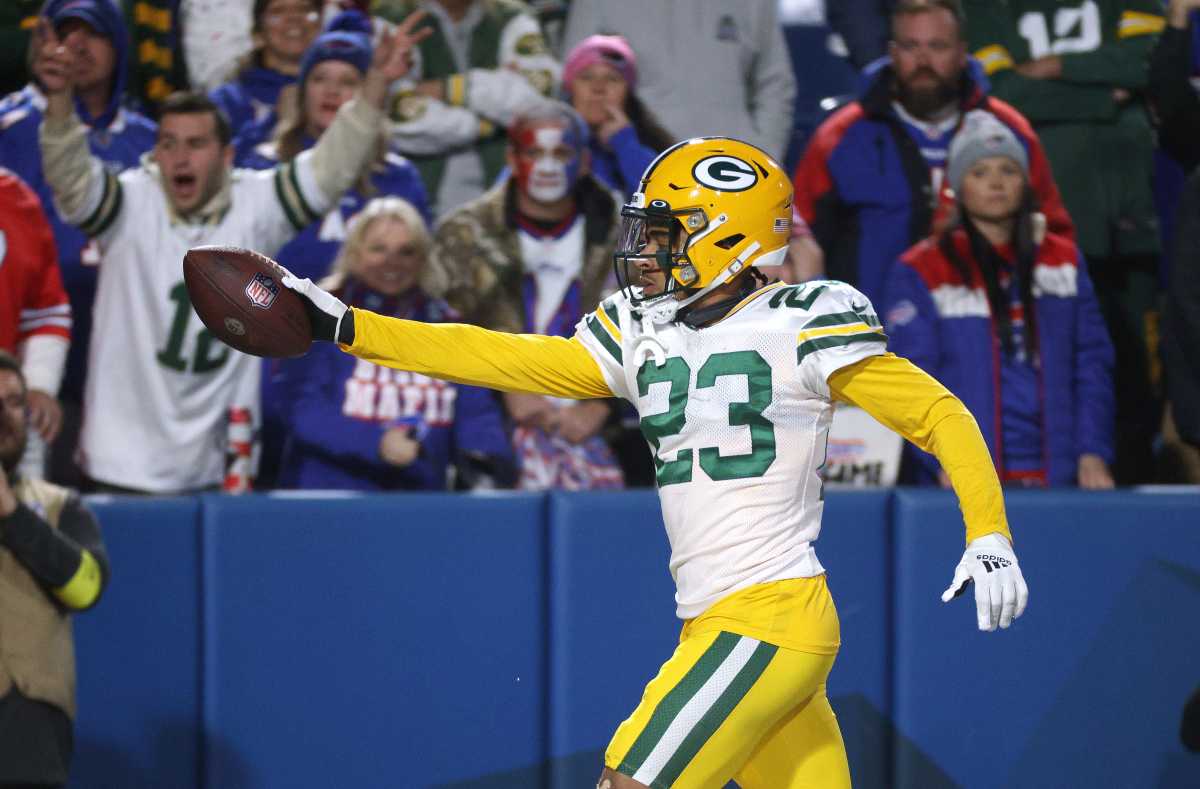
Jaire Alexander kept the Bills off the scoreboard with a fourth-quarter interception. (Photo by USA Today Sports)
In the first half, Bills quarterback Josh Allen was 8-of-11 passing for 129 yards with two touchdown passes. In the fourth quarter, Allen was 3-of-10 for 54 yards and two interceptions.
The Bills feature double-trouble receivers with cream-of-the-drop Stefon Diggs and elite deep threat Gabe Davis. Mostly, the Packers put Jaire Alexander on Davis. On four passes to Davis, Alexander allowed zero completions and recorded two interceptions. Alexander broke up the only time he was targeted against Diggs. It was a defensive masterpiece after giving up some key catches the week before at Washington.
Even with an excellent interception, it was a long night for Rasul Douglas, who gave up a touchdown to Diggs and was flailing in desperation in hopes of breaking up a deep ball that gained 53.
The pass rush was tremendous. PFF credited the Packers for 20 pressures. Officially, Jarran Reed (two) and Douglas (one) had the three quarterback hits. Douglas and backup linebacker Eric Wilson (on a 0-yard scramble) had the sacks. Allen, though, is a great player. Under pressure, he completed 6-of-13 for 166 yards and two touchdowns, according to PFF.
Grade: B-minus.
Rushing Defense
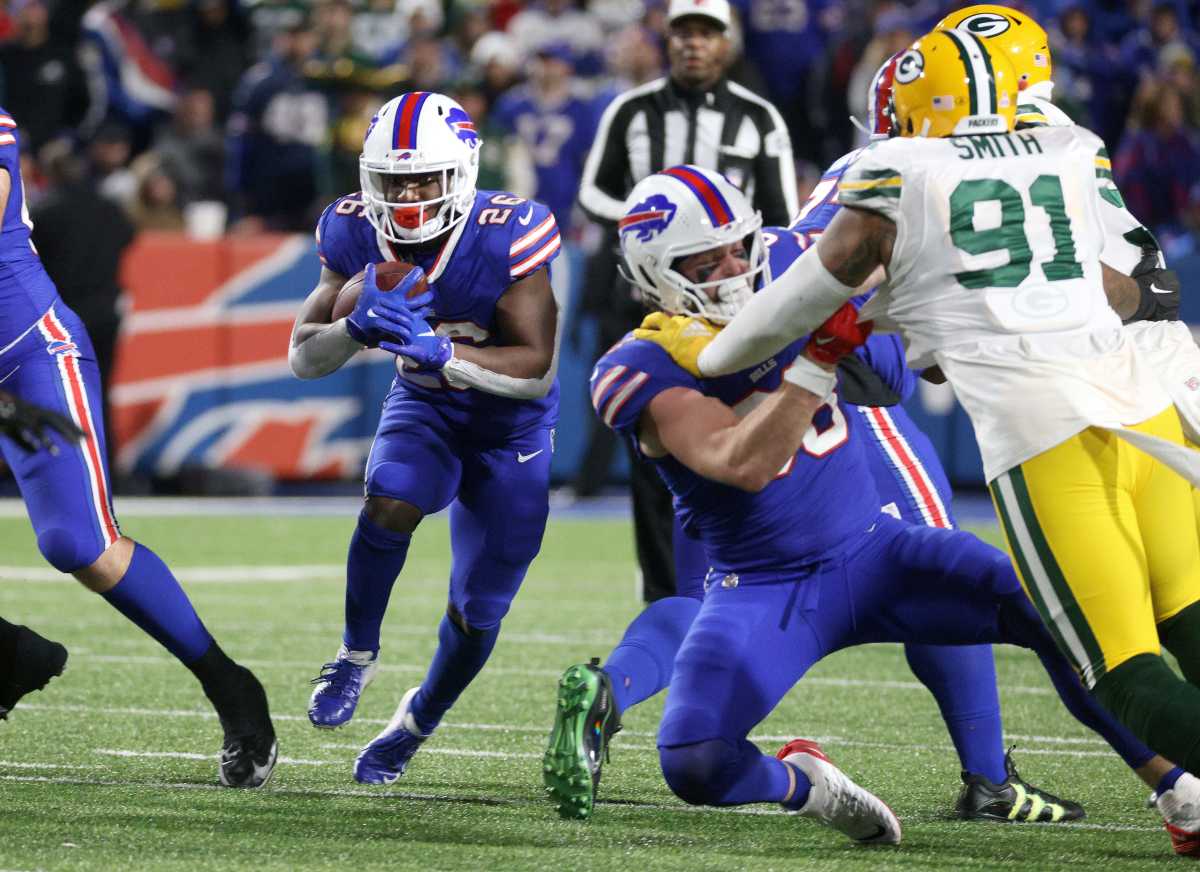
Devin Singletary found plenty of holes in the Green Bay defense. (Photo by USA Today Sports)
The Bills ran 27 times for 153 yards and one touchdown. Quarterback Josh Allen accounted for 49. Running backs Devin Singletary and James Cook combined for 19 rushes for 102 yards, and receiver Isaiah McKenzie added a 7-yard touchdown on an end-around.
Giving up some yards on the ground is the price of doing business against Allen and his exemplary receivers. By our count, the Packers missed a season-worst 14 tackles (both run and pass). Sometimes, the misses did no harm. Preston Smith missed three but the cavalry was always there. Other times, the misses turned small gains into big gains. In the second quarter, Singletary ripped off a 17-yard run that included a miss by safety Darnell Savage. Savage missed three tackles on the night. His tackling has gone from bad to horrible over his three-plus seasons.
Grade: D.
Special Teams
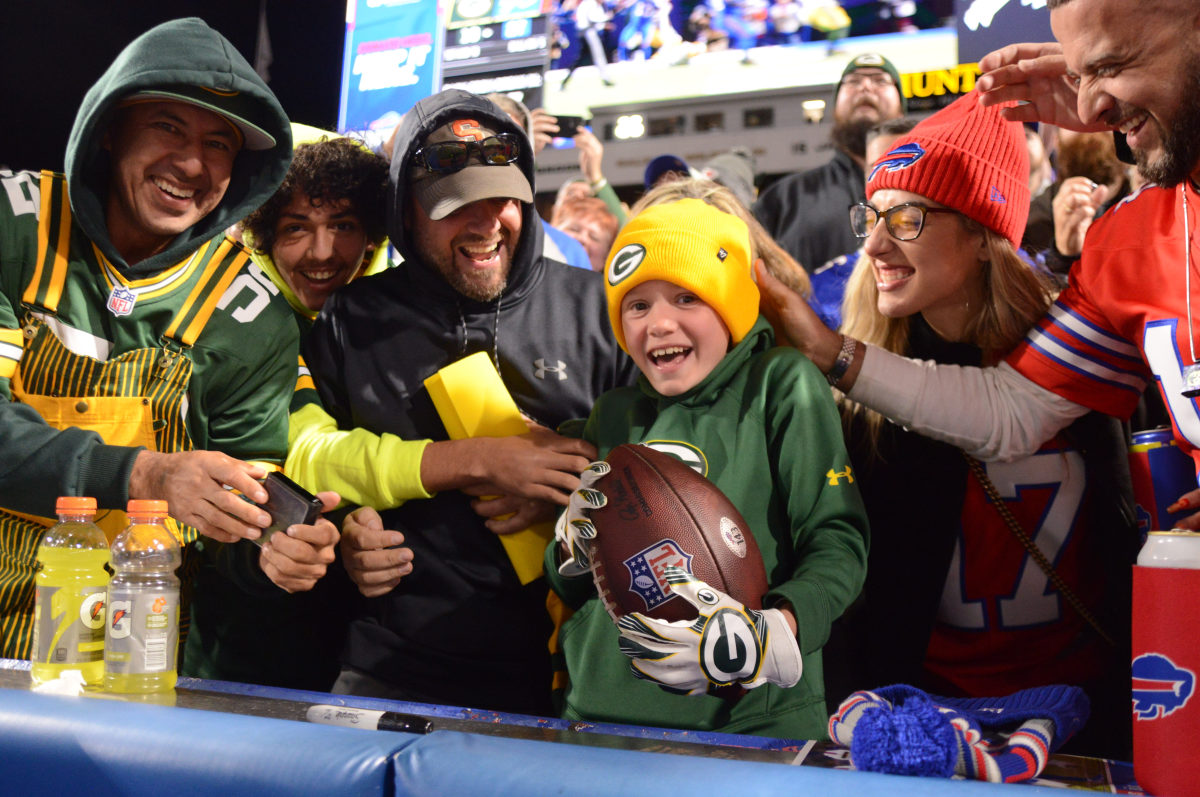
A fan is thrilled to get the football following Jaire Alexander's interception. (Photo by USA Today Sports)
Rich Bisaccia’s units, which started strong, are backtracking. The Packers gave up a 33-yard kickoff return to Isaiah McKenzie and a 17-yard punt return by Khalil Shakir. On kickoff returns, Keisean Nixon was stopped around the 20 on his first three opportunities. On the fourth, he got to midfield but that was nullified by a holding penalty on Innis Gaines.
Mason Crosby barely made a 38-yard field in the third quarter and missed from 55 in the final moments. On the latter, Jack Coco’s snap was terrible and Pat O’Donnell did what he could with the hold.
At least there weren’t any disasters?
Grade: D.
Coaching
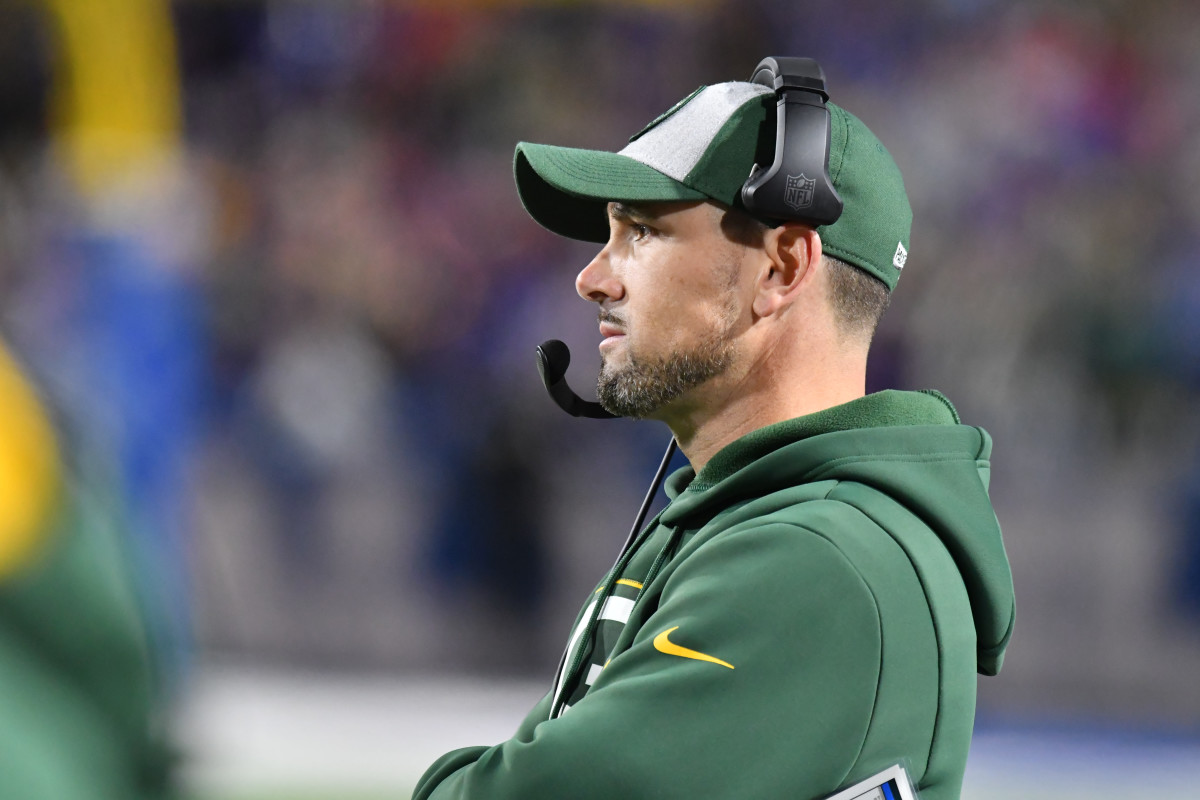
Matt LaFleur had never lost two in a row. Now, he's lost four in a row. (Photo by USA Today Sports)
Coach Matt LaFleur remembered he had a running game and rode it for as long as he could. It was as if he finally realized that getting the ball to Aaron Jones and AJ Dillon was the best approach on offense, and he used this game to thunder away with it to get ready for the second half of the season.
For weeks, defensive coordinator Joe Barry faced questions about his second-half defense. To change it up, his defense was bad in the first half. In totality, this was yet another game when the final numbers look pretty decent but hid the reality. The Bills scored on five consecutive possessions, with each of those possession covering at least 50 yards.
Meanwhile, discipline has gone out the window. Last year, according to NFL Penalties, the Packers were hit with a league-low 74 penalties. They’re up to 48 through eight games – including 31 during the four-game losing streak – a pace for 102.
The grade is bad, as it should be, unless LaFleur’s offensive approach really is a building block.
Grade: D-plus.
Related Stories: Packers at Bills
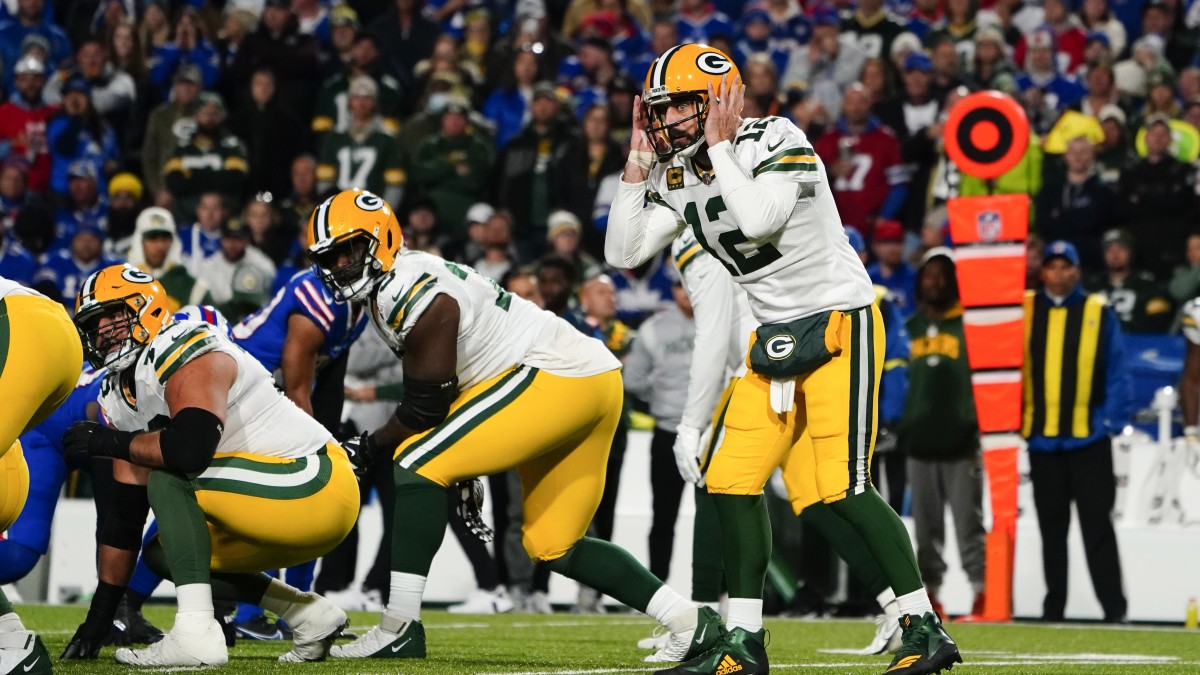
Bills 27, Packers 17: Game story, game ball and more
Quay Walker apologizes after ejection
Watch: Packers-Bills highlights
Live updates: Scoring highlights, injury updates and more
